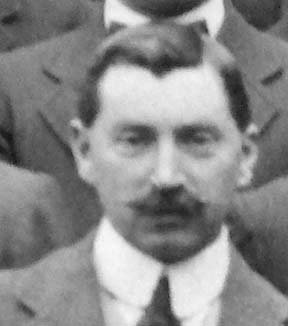


 تاريخ الرياضيات
تاريخ الرياضيات
 الرياضيات في الحضارات المختلفة
الرياضيات في الحضارات المختلفة 
 الرياضيات المتقطعة
الرياضيات المتقطعة
 الجبر
الجبر
 الهندسة
الهندسة 
 المعادلات التفاضلية و التكاملية
المعادلات التفاضلية و التكاملية 
 التحليل
التحليل
 علماء الرياضيات
علماء الرياضيات |
Read More
Date: 15-4-2017
Date: 19-4-2017
Date: 19-4-2017
|
Died: 20 January 1955 in Glasgow, Scotland

Alexander Durie Russell's father was Thomas Russell (born in Linlithgow in 1840) who was a grocer, but later became a fish merchant. His mother was Janet Durie (born in Midcalder in 1837).
Alexander Russell lived at 19 Graham Street, Edinburgh. He attended George Heriot's School in Edinburgh and passed the Preliminary Examinations of the Scottish Educational Department in English, Mathematics, Latin, Dynamics, French, and German in June 1889 and June 1890. He first matriculated at the University of Edinburgh in October 1890.
Russell then studied Chemistry with Crum Brown, Mathematics with Chrystal, Natural Philosophy with Tait, Botany with Balfour, and Natural History with Ewart. He graduated with a B.Sc. from the University of Edinburgh in 1896. He was awarded the Neil Arnott Scholarship in Experimental Physics. After a year as a Demonstrator in Physics at the University, he was appointed to Morelands School, Edinburgh, where he taught for one year. He then became a Master at Stranraer High School, Wigtownshire, teaching there for two years. In 1899 he became a Master at Falkirk High School, Stirlingshire, later being promoted to Head of Mathematics. He remained there for the rest of his career, retiring in 1937.
Russell was elected a Fellow of the Royal Society of Edinburgh on 12 December 1905 having been proposed by William Peddie, John Brown Clark, Robert Traill Omond, and Cargill Gilston Knott. A couple of years later he was elected a Fellow of the Royal Astronomical Society.
At the meeting of the Edinburgh Mathematical Society in February 1897 he became a member of the Society. He served on the Committee during 1906-09, was honorary treasurer during 1909-1915, and was then honoured with election as President for session 1915-16. He also contributed to the scientific work of the Society, for example he read the paper A special case of the dissection of any two triangles into mutually similar pairs of triangles to the meeting of the Society on Friday 8 December 1899.
In this obituary Russell is described as being [1]:-
... a keen churchman and was an elder of St Modan's Church, Falkirk. He was highly respected in the community for his personal character, ability and devotion to duty, and he will be greatly missed.



|
|
|
|
علامات بسيطة في جسدك قد تنذر بمرض "قاتل"
|
|
|
|
|
|
|
أول صور ثلاثية الأبعاد للغدة الزعترية البشرية
|
|
|
|
|
|
|
مكتبة أمّ البنين النسويّة تصدر العدد 212 من مجلّة رياض الزهراء (عليها السلام)
|
|
|